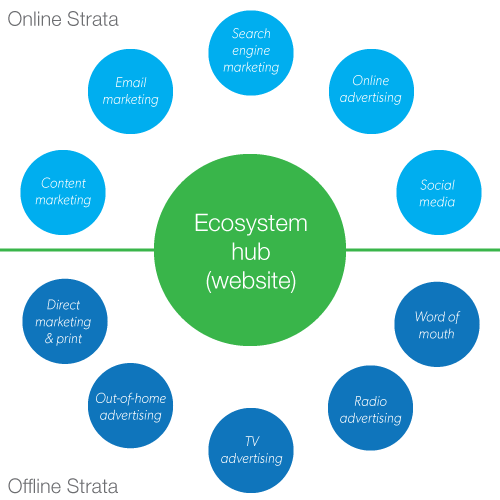In my last post, I wrote about how we have recently established a web strategy that aims to develop, nurture and evolve an organisation’s online presence – we call it the Brand Identity Ecosystem.
 Fig 1: The Brand Identity Ecosystem with all of its possible elements.
Fig 1: The Brand Identity Ecosystem with all of its possible elements.
Building a successful ecosystem is not possible without measurement. Organisations must establish a means of measuring the success or failure of each of their marketing elements in order to nurture and evolve their ecosystem. This nurture and evolution is the only way to protect their brand and ensure they continue to get a return on their online investments.
The importance of measurement: a Facebook success story
With Facebook being the largest social networking platform in the world, ever, it is no surprise that many organisations, and individuals, include it in their Brand Identity Ecosystem. It provides potential access to millions of new (and existing) clients, customers and fans – and, more importantly, facilitates targeted advertising.
CM Photographics were able to generate lucrative business leads using Facebook advertising because it provided the ability to target their exact demographic — 24-30 year old women whose relationship status on Facebook indicated that they were engaged. Over 12 months, CM Photographics generated nearly $40,000 in revenue directly from a $600 advertising investment on Facebook. Of the Facebook users who were directed to CM Photographics’ website from the ads, 60% became qualified leads and actively expressed interest in more information [Source].
What is apparent from this case study is the evidence of the use of measurement by CM Photographics. The ability to identify the percentage of qualified leads from the Facebook ads allowed them to then calculate the revenue that was generated from the $600 investment. This is a great example of identifying a potential extension to an ecosystem (Facebook), investing money in marketing on that platform, measuring its success or failure, and then nurturing the ecosystem (they can now invest more, because they have proof of the return-on-investment).
Evolving, when measurements uncover vulnerabilities
However, a recent BBC investigation has found that there is an increasing trend of fake Facebook profiles that click on thousands of adverts, even though it appears they have no real interest in the brand.
The BBC created a Facebook page for VirtualBagel – a made-up company with no products. The number of “likes” it attracted from Egypt and the Philippines was out of proportion to other countries targeted such as the US and UK. One Cairo-based fan called himself Ahmed Ronaldo and claimed to work at Real Madrid.
The investigation also revealed that these fake profiles, more often than not, had liked almost three thousand other Facebook profiles, which were often unrelated to each other, which is not what you’d expect from a genuine person.
All of these findings have raised doubts about the value of the Facebook ad and Like, therefore, organisations need to continuously measure the effectiveness of their Facebook investment. That’s not just monetary investments, but also time. It may become apparent that using Facebook for marketing isn’t yielding a big enough return-on-investment, at which point their Brand Identity Ecosystem needs to evolve to include other more effective means of connecting with their customers.
Discussing the tools for measuring the effectiveness of an ecosystem warrants its own blog post, but any organisation that is participating in Facebook advertising should, at least, have Google Analytics installed on their website (to measure users arriving from Facebook), and should closely follow Facebook FMC guide to measuring success.


